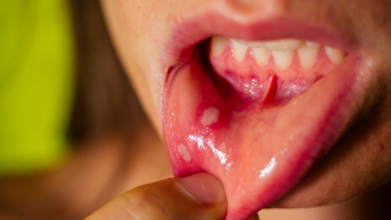- Health Conditions A-Z
- Health & Wellness
- Nutrition
- Fitness
- Health News
- Ayurveda
- Videos
- Medicine A-Z
- Parenting
- Web Stories
15 Minutes In The Sun Can Reveal This Sign Of Skin Cancer

Skin cancer is much more common than people think it is. It is a disease where cancer cells form in the tissue of the skin. The National Cancer Institute explains that there are different types of skin cancer. While it is treatable, any cancer diagnosis comes with the understanding that your chances of survival are declining. A big reason why it is so treatable is because of early diagnosis. This particular symptom of skin cancer becomes much more apparent with just 15 minutes in the sun.
As many enjoy the recent sunny weather, it's crucial to be aware of the risks of sun exposure. Cancer UK is urging everyone to monitor their skin for signs of skin cancer, which can develop after as little as 15 minutes in the sun. Even with sunscreen, you can still get burned if the SPF isn't high enough or if it's not reapplied regularly.
Link Between Sunburn and Cancer Risk
Getting a sunburn is a clear indication of skin damage caused by too much UV radiation, which harms the DNA in your skin cells. While one sunburn doesn't guarantee skin cancer, the more often you get burned, the higher your risk. To protect yourself, remember to:
Seek shade
Stay in the shade, especially between 11 AM and 3 PM, when the sun's rays are strongest. This greatly lowers your exposure to harmful UV radiation, making it safer to be outside during these peak hours.
Cover up with loose clothing
Wear loose clothing, a wide-brimmed hat, and UV-protective sunglasses. These items create a barrier, shielding your skin and eyes from direct sunlight and reducing your overall sun exposure.
Apply sunscreen
Use sunscreen with at least SPF30 and 4 or 5 stars, and put on plenty of it, often. Regular and correct sunscreen use creates a protective layer, significantly lowering your risk of sunburn and long-term skin damage from UV rays.
Spotting the Early Warning Signs
Non-melanoma skin cancer often shows up on skin exposed to the sun. To catch it early, it helps to know how your skin normally looks so you can spot any changes. Regular self-checks are key for early detection. Here's how to check your skin:
Use a handheld mirror for hard-to-see areas, or ask a friend or partner for help. This ensures you don't miss any suspicious spots on your back or other less visible parts of your body.
Take photos of anything that seems unusual. Include a ruler or tape measure in the photo to track its size and changes. These pictures are important for your doctor to assess any evolving skin concerns. They might look like:
- A new spot or sore that doesn't heal within a few weeks. Persistent, non-healing lesions are a significant warning sign that warrant immediate medical attention to rule out cancerous growth.
- A new lump that is firm, growing, or has an unusual color. Any new, unexplained lump on your skin should be promptly evaluated by a healthcare professional, especially if it changes in appearance.
- A red or dark patch that might be scaly or crusty. Discolored patches, particularly those with rough textures or irregular borders, can be indicators of skin cancer and require medical assessment.
- Something that is itchy, crusty, or bleeding without obvious injury. These symptoms, especially when persistent, suggest that a skin lesion might be abnormal and necessitate a doctor's examination for proper diagnosis.
Mouth Ulcers Are Common, But Run To Your Doctor Or Dentist If You Notice These Signs

A tiny sore in your mouth might not seem like a big deal until it starts to sting every time you eat, drink, or even breathe. Mouth ulcers are more common than we give them credit for. Usually, they’re nothing to worry about. But if they’re showing up a bit too often or staying longer than usual, it’s time to pay attention.
Here’s a look at when to shrug it off, when to switch to soup, and when to book that appointment with your dentist or GP.
Ulcers Happen But Not All Should Be Ignored
Normally, ulcers usually clear up within two weeks and are often linked to being run down or low on certain vitamins. But if that ulcer refuses to budge after three weeks, it’s not something to ignore. Cancer Research UK recommends seeing a doctor or dentist if an ulcer or a red or white patch is still hanging around after three weeks. It could be harmless, but it could also be your body waving a little red flag.
DIY Healing
Most mouth ulcers don’t need a lot to treat. The NHS says they’ll usually heal with time and a little TLC. That said, you can speed things up by not doing things that make them worse.
Skip the spicy curries, salty snacks, acidic foods, and crunchy culprits like toast or crisps. Basically, if it hurts to eat it, you shouldn’t be eating it. Hot and acidic drinks like fruit juice are also a no-go. As for toothpaste, check the label, avoid ones with sodium lauryl sulphate, a foaming agent that can irritate ulcers.
Instead, go soft and soothing. Stick to cool drinks, go for gentle foods, and switch to a soft-bristled toothbrush that won’t scratch or poke at sensitive areas. Regular dental check-ups and a balanced diet also go a long way in keeping your mouth happy.
Not All Ulcers Are Created Equal
Most of the time, ulcers are just that: temporary sores. But if you’re dealing with one that refuses to heal, is especially large or painful, or comes with other symptoms like swelling, difficulty eating, or a lump in the neck, don’t play the waiting game. It might be something more serious, like an infection or in rare cases, something that requires more thorough investigation.
Prevention
If you’ve had your fair share of ulcers and want to avoid the next round, the answer lies in prevention. Aside from dodging the usual food triggers, it helps to manage stress, get enough sleep, and eat a diet rich in iron, folate, and B vitamins. Also, drink plenty of water and make sure your mouth stays clean.
Regular dental visits help your dentist spot the early signs of anything unusual and give you personalised tips on how to avoid recurring ulcers.
Don’t Panic, But Don’t Ignore
Mouth ulcers are rarely serious. Still, it’s better to be safe than sorry. If your ulcer overstays, refuses to heal, or comes with other odd symptoms, get it checked. And while you wait it out, treat your mouth gently. Avoid fiery foods, switch to a soothing routine, and try not to poke at it with your tongue.
When Your Phone Ping Feels Like a Threat: The Science Behind Cortisol Spikes, Sleep Disruption and Notification Anxiety

If you’ve ever felt your heart rate spike just because your phone buzzed during dinner, you’re not alone. In our hyper-connected lives, notifications can set off a full-blown biological alarm. But what’s happening inside you isn’t just “in your head”; it’s ancient biology meeting modern tech, and the result is often anxiety, chronic stress and, eventually, burnout.
Here’s why you panic every time that screen lights up and how to stop spiralling into stress over a simple message.
Your brain may be rational, but your hormones have other ideas. According to reports, the moment a message lands, especially one that feels urgent or work-related, your body launches into ‘fight or flight’ mode.
Cortisol, the stress hormone, floods your system and primes you to react. And if the ping is from your boss or an emotionally charged source, the cortisol surge can be even more intense.
To make things worse, adrenaline often tags along. This amps up alertness, raises your heart rate and makes it nearly impossible to relax. Your brain is preparing you to flee from danger even if the only threat is an email with the subject line “quick update”.
The Dopamine Trap
Just to complicate things, dopamine, the pleasure chemical, also plays a part. Every time you check your phone and respond, your brain rewards you with a little shot of satisfaction. That’s why it’s so easy to get hooked and why you keep checking even though it stresses you out.
When Oxytocin Gets Triggered
Normally, messages from loved ones trigger oxytocin, the hormone that helps us bond and feel safe. But when the messages are draining, demanding or tied to work, that warm fuzzy feeling gets pushed out by stress chemicals. Over time, this can disrupt your ability to be present and genuinely connect with others, leading to burnout.
Melatonin Meltdown
And if you’re checking those pings before bed, you should stop. Reports warn that notifications late at night reduce the production of melatonin, the hormone responsible for quality sleep. Without it, you may struggle to nod off, stay asleep or feel rested, fuelling a cycle of fatigue, brain fog and even more stress.
The Long-Term Fallout
If this sounds like an exhausting loop, it is. Consistent cortisol spikes and dopamine hits can wreak havoc on your health. Think weight gain, insomnia, poor focus and a fried nervous system. In fact, studies show that 76 per cent of millennials and 40 per cent of baby boomers admit to feeling anxious the moment their phone lights up.
Here are a few tricks to help you break the cycle.
1. Set Notification Boundaries
Draw a digital line in the sand. Turn off alerts after a set time or batch-check messages every few hours instead of reacting instantly. Use your phone’s ‘Do Not Disturb’ mode to protect time for real life.
2. Mute the Noise
Not every ping is essential. Reports suggest turning off non-urgent app and group chat notifications. Fewer pings mean fewer cortisol spikes and less temptation to fall down the notification rabbit hole.
3. Prioritise In-Person Conversations
Texts are easy to misread, and fast replies aren’t always the best ones. If possible, have real conversations with friends, colleagues or family. Face-to-face talks promote oxytocin, reduce stress and avoid unnecessary misunderstandings.
4. Train Yourself to Pause
Next time your phone buzzes, don’t jump. Take five deep breaths. Count to five. Ask yourself if the message needs an immediate reply. This tiny pause rewires your stress response and reins in that hormone cascade.
5. Keep Work Messages in Their Lane
When work bleeds into personal time, stress seeps in. It is recommended to have a chat with your manager or team about boundaries. Set a window for work-related conversations and stick to it. Your wellbeing shouldn’t be a casualty of always being “available”.
No Time For Brain Decline - Lifestyle Habits That Reduce The Risk Of Dementia In Older Adults

The interesting thing about people is how unique everyone’s perspectives are. Everyone has their way of thinking, their own way of doing things as well as their own unique memories. These aspects make us human and set us apart from everyone. Can you imagine losing all of these because of a disease that robs you of your cognitive abilities? Dementia is not as uncommon as we think it is. Affecting millions, we are yet to find a cure for this disease. While researchers have identified risk factors, does changing them make any difference?
A new study asked an important question: Can making specific changes to our daily lives actually improve or protect our thinking skills as we get older, especially for those who might be at risk of memory problems or dementia?
Organized Efforts Work Better
This study involved over 2,100 older adults who faced a higher chance of their thinking skills declining. We compared two different groups over two years. One group followed a well-organized plan for healthy living. This plan included regular moderate to intense exercise, sticking to a special "MIND diet," doing activities that challenge the brain and encourage spending time with others, and regular checks on heart health. The other group got a less organized plan that they had to follow more on their own.
This was a big study where neither the participants nor the initial assessors knew which group someone was in. It took place in 5 different medical centers across the U.S. from 2019 to 2023. We included 2,111 people between 60 and 79 years old who weren't very active and didn't eat the best diet. To make sure we studied people truly at risk, they also had to have at least two other risk factors, like a family history of memory issues, heart problems, or just being older.
- Structured Group, who received a detailed, ongoing plan for exercise, diet, brain-challenging activities, social time, and heart health checks. They had more guidance and were regularly checked on.
- Self-Guided Group, who got general advice on the same healthy lifestyle areas but had less structure and fewer regular check-ins.
The main goal was to see how much a person's overall thinking ability changed each year over the two-year study. We used a combined score that looked at different brain skills like planning, remembering things, and how quickly their brain worked.
Results of the Study
Out of all the people who started, almost 90% finished the two-year assessment. Both groups showed some improvement in their thinking scores over time. However, the structured group's improvement was clearly bigger than the self-guided group's.
Interestingly, the benefits of the structured program were helpful whether or not a person carried a specific gene (APOE 4) linked to Alzheimer's risk. But, the structured program seemed to help those who had lower thinking abilities at the beginning of the study even more.
We also kept track of any problems or side effects. The structured group actually reported fewer serious and non-serious problems compared to the self-guided group. The most common health issue overall was getting COVID-19.
What This Means for You
The results clearly showed that the organized group had a noticeably better improvement in their overall thinking abilities. Their brain scores went up more each year compared to the group that followed the less organized plan. This means that having a structured approach made a bigger positive difference for their brains.
The findings suggest that if you're an older adult at risk of memory problems, a structured, more involved healthy lifestyle plan is more helpful for your thinking skills than trying to do it all on your own with less guidance. We still need more research to see how much these brain improvements affect daily life and if they last for many years.
It's really important to find ways to slow down or prevent memory loss that can lead to dementia. Things we can do in our daily lives, like changing our habits, are promising because they are usually affordable, easy to access, and safe. They offer a good way to protect our brains without relying on medicines alone.
© 2024 Bennett, Coleman & Company Limited


